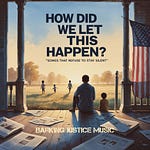“If Donald J. Were Black” is a bold, unflinching protest anthem from Barking Justice Music that asks one haunting, clarifying question: Would justice bend if Trump looked like the people it so often targets? Told through powerful call-and-response verses, spoken word, and layered vocal harmonies, the song contrasts the privileges extended to white power with the harsh reality faced by Black Americans in the criminal legal system. With sharp lyrics that expose racial double standards in media, politics, and law, it dismantles the myth of equal justice under the law. Backed by urgent beats and gospel-tinged soul, this track is not just a song—it’s an indictment. A memory. A mirror. A demand.
Lyric Breakdown: “If Donald J. Were Black”
By Mika | Barking Justice Music
Verse 1 – Setting the Stakes
“If Trump were Black, they’d shut the door…”
The opening line frames the entire piece: it’s not about Trump’s policies, but what his privilege of whiteness has shielded him from. The verse sets up a parallel universe, drawing immediate contrast with how America historically treats Black men in power (or those seeking it). It’s a gut-check to the justice system’s double standards.
⚖️ Verse 2 – Legal System Contrast
“Ninety-one charges, clear as day…”
This verse confronts the legal absurdity head-on: the idea that any Black man facing 91 criminal charges would not only remain free, but remain viable as a presidential candidate. The structure uses repetition to underscore the idea that whiteness grants deferrals, while Blackness invites incarceration—even without conviction.
Chorus – The Counterfactual Truth
“(Trump) If he were Black, would justice bend?”
“(Response) No mercy shown, no chance to mend.”
The call-and-response pattern builds a communal indictment. The chorus speaks not just to Trump’s impunity, but to a historic denial of fairness to Black Americans. Each chorus reinforces the core thesis: equal behavior, unequal consequence.
Verse 3 – Media & Memory
“They’d paint him ‘angry,’ ‘overblown’...”
This is a sharp turn toward how media narratives racialize perception. When Trump lashes out, he’s “tough.” If he were Black, the same behavior would label him as “threatening.” This verse deconstructs coded language and the long history of Black character assassination by the press.
Verse 4 – History’s Witness (Central Park Five)
“Falsely accused, five youth betrayed…”
This powerful callback brings receipts—reminding listeners that Trump himself advocated for the execution of Black and Latino boys falsely accused of rape. Despite exoneration, he has never apologized. This verse cements the emotional core: Trump doesn’t just benefit from systemic racism—he has helped perpetuate it.
Bridge – What’s Rebellion When White?
“They stormed the Capitol—cops stood back…”
The bridge contrasts Black protest vs. white rebellion. The lyrics flip the script on January 6, illustrating how law enforcement restraint is racially selective. The final two couplets:
“Our cries are threats, their war is myth…”
“Yet we’re called the threat, while they’ve lied enough.”
...are poetic justice wrapped in accusation.
Spoken Word Close
“If Donald Trump were African American, he wouldn’t be running for office—he’d be running for his life.”
This line drives the truth home. Spoken over a melodic background, it adds personal tone and finality, anchoring the song in realism and urgency.
Final Chorus – The Loop of Injustice
The repetition of the chorus reminds us: the system isn’t broken—it’s working exactly as designed. The repetition doesn’t just make it catchy—it makes it unavoidable.











Share this post